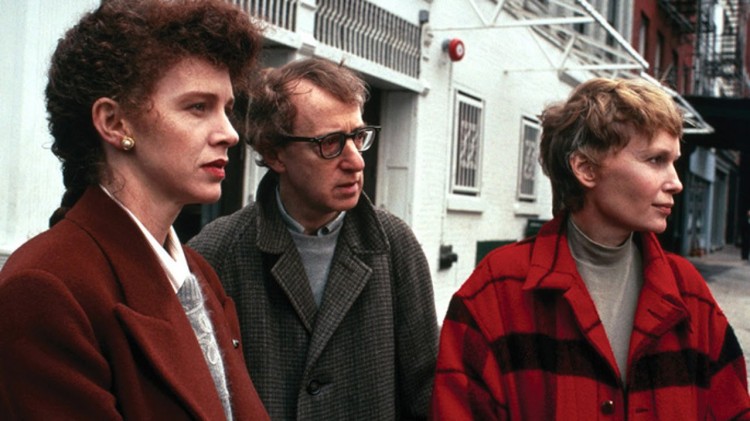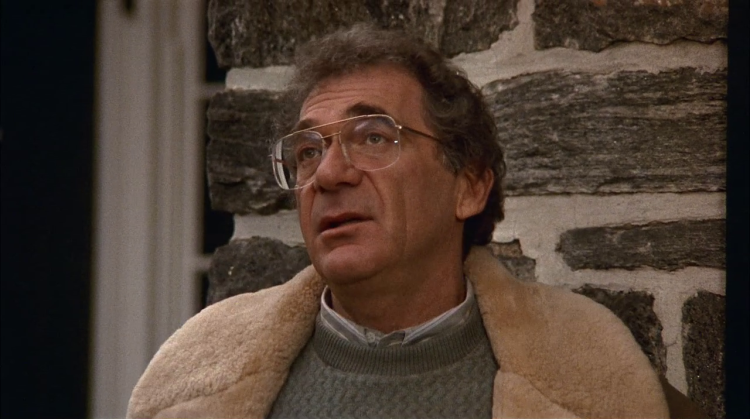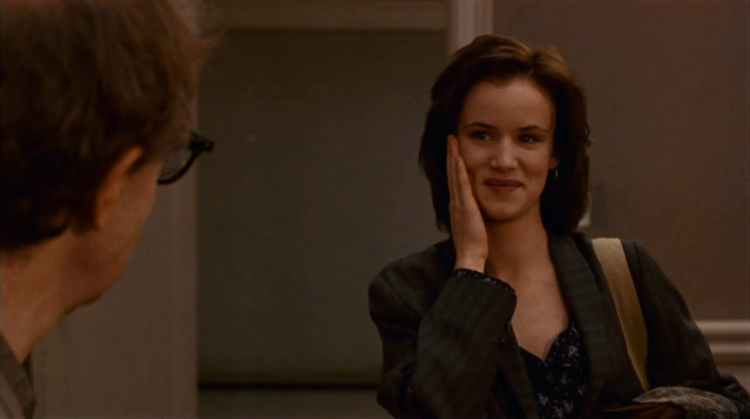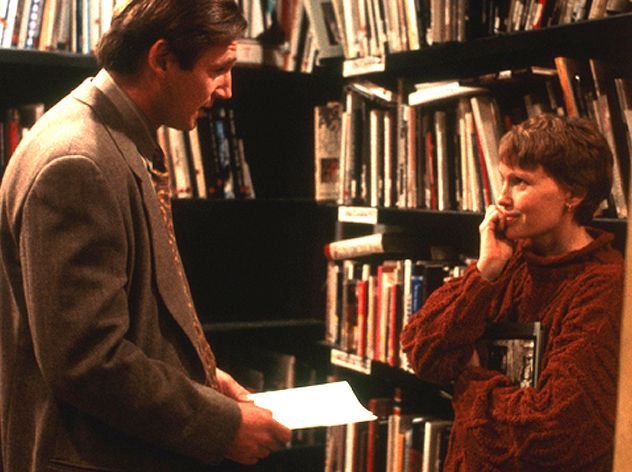Husbands and Wives, directed by Woody Allen, is truly one of his underrated gems. It demonstratres his ability to perfectly blend comedy with tragedy that forms part of his trademark tragicomic style, accumluating into a Chekhov-esque drama that portrays Allen’s hangups and insights into the intricacies of marriage, the development of affairs and the impetus for divorce.
The film is filmed in a documentary style, the film potrays two marriages that encounter trials and tribulations, testing the value and meaning of love between the two. Interviews with charatcers are intercut between interactions with people and are often used cynically and ironically to express the mindset of a character towards others or an idea. For example, Mia Farrow’s character, Judy, whose ex-husband is a university valedictorian, claims that she is passive-aggressive and did not enjoy their anniversary gifts despite their value, while Sally claims that she did not recieve enough love and the gift was just a cheap coffee machine.

A narrator narrates the film as it progresses, exposing information in sometimes a non-linear way, showing past events or stories unfold that give meaning to events or relationships between characters. This serves as an interesting take on the documentary genre. Some could consider the film to be a mockumentary, but I struggle to find real comedic mocking that is usual in mockumentaries from filmmaker Christoper Guest in This is Spinal Tap and Waiting for Guffman and even in the previous mockumentary by Allen, Zelig, which, I argue, mocks the genre and experiments with the codes and conventions of documentary filmmaking.
Indeed, Husbands and Wives finds an interesting balance in how it uses the idea of the documentary style, opting for the comedy to be very sparse and subtle, with the real comedy being fuelled by Allen’s sense of ironic humour, situational based instances, such as when Jack (potrayed by Sydney Pollack)’s new girlfriend, a stereotyped ‘dumb-blonde’ character called Sam, who enters into the relationship after Jack and Sally (performed with razor sharp precision and impressive gusto) divorce, embarrases herself at a dinner party by discussing star sign horoscopes with physcicans.

Husbands and Wives works best when it balances and juggles the lives of the four central characters. Woody Allen plays Gabe Roth, a Columbia university professor of literature who is married to Mia Farrow’s Judy. The film depicts the decline of their marriage and eventual divorce and dissects the reasons for it. Roth’s story forms part of Allen’s commonplace storylines of an older, lost, and usually male, character falling hopelessly for a younger woman. Interesstingly, Allen’s take on his all too common story beat is somewhat reversed. As Roth’s marriage fails, one of his students, Rain, played by Juliette Lewis, takes an interest in Roth during the classes and the two exchange self-written literature and discuss the essence of art.

Roth doesn’t seem to be as attracted to Rain as Rain is to Roth, contrasting, somewhat, Allen’s idea of an older male seeking younger campionionship. The film finishes the Roth/Rain storyline with Rain and Roth kissing at Rain’s twenty-first birthday, at which Roth exclaims is an utter mistake and laments that his marriage with Judy is well and truly over; he asserts the claim that Judy was the only one that he truly loved. The nature of Judy and Roth’s relationship in the story is also somewhat familiar and realistic, even contextual at times. This was Mia Farrow and Woody Allen’s final contribution together, with allegations being made against Allen less than a year after the film’s release. Perhaps Farrow’s performance is driven, somewhat, by this event, which adds to the versimilitude of the performances.
Generally, the film excels in providing a naturalistic look on the relationships that Allen expounds on in his previous films, especially in films like Manhattan and Annie Hall. Here, Husbands and Wives also interrogates the nature of love. Despite breaking apart due to cheating and encountering many setbacks and arguments surrounding their divorce, Sally and Jack end up back together again, with them claiming their previous years of marriage being too strong a bond to keep them apart. This is an interesting insight; the two characters themselves encounter the hardships of love during their stint as single people. Sally experiences love purely in a physical sense and does not bond with Michael Gates (played by Liam Neeson), who is a romantic himself and believes in a more poetic and spiritual form of love created through mental compansionship and empathy.

Sally, on the other hand, is fairly inert and therefore, does not enjoy the mental aspect or physical bonding with Michael. Jack, on the other hand, claims early on that he is in love with Samantha, an anncouncement purely brought on out of spite for Sally. Jack’s preference for younger woman is expanded upon in a scene where Gabe Roth recounts an analogy of an instance of Jack struggling to decide whether or not to call upon a young female prostitute. However, Jack’s relationship with Samantha ends when she is not mentally compatible. Nevertheless, both Jack and Sally resume their relationship because they realise that they are perfect for eachother and being single destroyed their stable years of marriage. This suggests to me that Allen believes that the idea of love is individual to us; despite the ostensibly stable marriage between Gabe Roth and Judy, they are seperated at the end with Judy marrying Neeson’s Michael. Love itself isn’t something that is all encompassing and powerful, Allen argues, but a mental idea that causes people to desire more. Judy desires more of an interpersonal and spiritual compansionship, Sally and Jack desire a stable relationship of mutual happiness and Roth desires the ideal woman, of which both Rain and Judy aren’t.
Husband and Wives is an excellent case study and analysis of marriages and its’ relationship to the idea of love and psychology of divorce. By using a documentary format, the filmmaker brings naturalism and realism, which is emphasised by believeable dialogue that seem to be taken directly from real conversations, along with performances capture the mannerisms of everyday average people who simply create problems for themselves- just another typical Woody Allen film.
